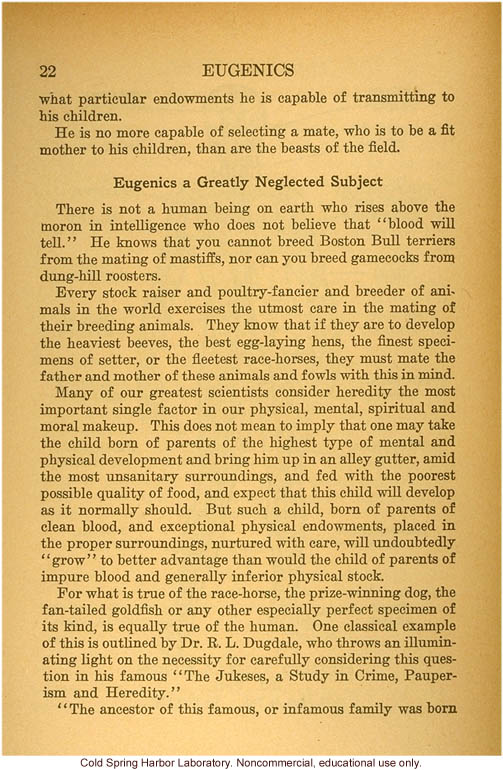22 Eugenics
what particular endowments he is capable of transmitting to his children.
He is no more capable of selecting a mate, who is to be a fit mother to his children, than are the beasts of the field.
Eugenics a Greatly Neglected Subject
There is not a human being on earth who rises above the moron in intelligence who does not believe that "blood will tell." He knows that you cannot breed Boston Bull terriers from the mating of mastiffs, nor can you breed gamecocks from dung-hill roosters.
Every stock raiser and poultry-fancier and breeder of animals in the world exercises the utmost care in the mating of their breeding animals. They know that if they are to develop the heaviest beeves, the best egg-laying hens, the finest specimens of setter, or the fleetest race-horses, they must mate the father and mother of these animals and fowls with this in mind.
Many of our greatest scientists consider heredity the most important single factor in our physical, mental, spiritual and moral makeup. This does not mean to imply that one may take the child born of parents of the highest type of mental and physical development and bring him up in an alley gutter, amid the most unsanitary surroundings, and fed with the poorest possible quality of food, and expect that this child will develop as it normally should. But such a child, born of parents of clean blood, and exceptional physical endowments, placed in the proper surroundings, nurtured with care, will undoubtedly "grow" to better advantage than would a child of parents of impure blood and generally inferior physical stock. For what is true of the race-horse, the prize-winning dog, the fan-tailed goldfish or any other especially perfect specimen of its kind, is equally true of the human. One classical example of this is outlined by Dr. R. L. Dugdale, who throws an illuminating light on the necessity for carefully considering this question in his famous "The Jukes, a Study in Crime, Pauperism and Heredity."
"The ancestor of this famous, or infamous family was born


